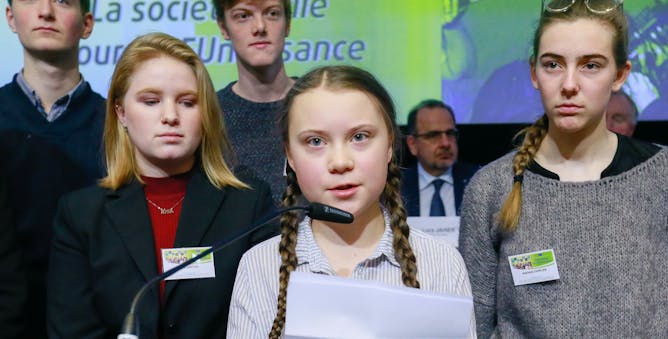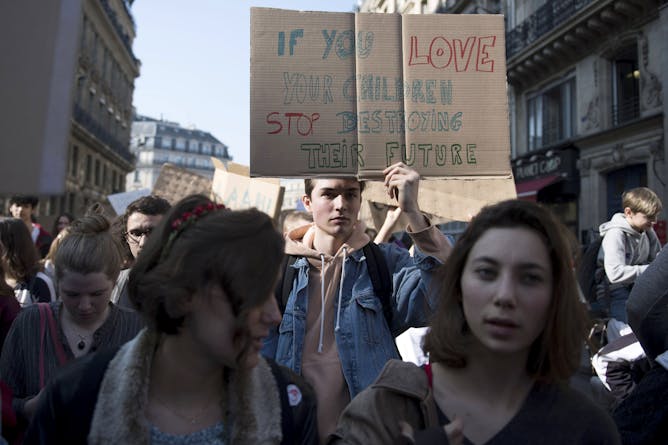|
|
|
Editor's note
|
|
Most Australians accept climate change is real, but we continue to live much as we always have. Young people, writes Blanche Verlie, are shaking off this delusional paradox. Climate change is more than just an “issue” for the next generation: it’s an urgent existential threat to their future. Today more than 50 school strikes are planned across Australia, as part of protests in 82 countries. Profoundly concerned about climate change, which has
been a reality for longer than most of the protesters have been alive, these students are creating a new cultural identity in opposition to the complacent, politicking adults running their countries.
And politicians have slammed skipping school to participate in the protest as an act against education itself. But Karena Menzie-Ballantyne argues by taking part in the protest, students are actually learning. They are demonstrating understanding of contemporary global issues, ability to think critically, to communicate and work effectively with others, as well as values and attitudes that focus on the common good beyond their own
self-interest.
|
Madeleine De Gabriele
Deputy Editor: Energy + Environment
|

|
|
Top story
|

Sixteen year-old Greta Thunberg inspired global climate change school strikes.
Stephanie Lecocq/AAP
Blanche Verlie, RMIT University
Facing up to the horror of climate change can help us work towards a more sustainable culture. Young people are leading the way.
|

Why would striking students end up in the ‘dole’ queue’ when they’re seeking to understand a global issue, taking action and clearly articulating their perspective?
Julien De Rosa/AAP
Karena Menzie-Ballantyne, CQUniversity Australia
When politicians caution against student strikes for climate action, they are going against the aims of Australia's curriculum to develop citizens with a social conscience, willing to take action.
|

One way to see the value of meaning is to share information and cooperate with others.
Mario Purisic/Unsplash
Jamie Freestone, The University of Queensland
The self-help books are full of advice on how to get meaning in life, but it helps to understand what meaning actually is. Science may be able to provide some answers.
|
Science + Technology
|
-
Chrystal Zhang, Swinburne University of Technology
The fallout from Boeing grounding some of its aircraft amid safety concerns will hit both passengers and airlines. Be prepared for delays and higher fares.
|
|
Health + Medicine
|
-
Kelsey Hegarty, University of Melbourne; Mohajer A. Hameed, University of Melbourne; Simone Tassone, University of Melbourne
What's often missing from domestic violence responses are investments and strategies to stop men perpetrating violence in the first place.
-
David Farmer, Florey Institute of Neuroscience and Mental Health
The brain itself can’t actually feel pain. It can't sense damage to itself the way your finger can. We know this because people can have brain surgery while they are totally awake.
|
|
Politics + Society
|
-
Tony Walker, La Trobe University
Former Trade Minister Andrew Robb's criticism may be a little exaggerated, but there's no doubt the relationship is tricky and still needs work.
-
Ian Waters, University of Divinity
The Catholic Church has previously expelled perpetrators of child sexual abuse from the priesthood following internal investigations – known as canonical trials.
-
William Isdale, The University of Queensland; Jonathan Fulcher, The University of Queensland
A decision to award A$2.5 million compensation for loss of native title marks an important shift in how such claims are handled.
-
Philippa Collin, Western Sydney University
There are more than 1.3 million young Australian voters in NSW, but they feel excluded from traditional politics. To win the youth vote, politicians must address the key issues that matter to them.
|
|
Business + Economy
|
-
Michelle Grattan, University of Canberra
But the ALP has not put a figure on the amount it believes would be appropriate.
-
Richard Holden, UNSW
Josh Frydenberg wants to leave mortgage broker commissions unchanged for three years. It's hard to see why.
-
Supriya Singh, RMIT University
Rather than focusing on specific cultural practices, we need to concentrate on all forms of economic abuse as coercive control.
|
|
Arts + Culture
|
-
Alex Cothren, Flinders University; Robert Phiddian, Flinders University
Today's screen satire frequently preaches to the converted. Fortunately, there are some notable exceptions that can skewer even the most progressive of viewers.
-
Axel Bruns, Queensland University of Technology
The National Library of Australia's web archive preserves online Australian content dating back to 1996. The next step is to archive platforms such as Facebook and Twitter - but it won't be easy.
|
|
Cities
|
-
Laurence Troy, UNSW; Bill Randolph, UNSW; Ryan van den Nouwelant, Western Sydney University
Housing markets never have met the lowest-income households' needs. Now is the time to tackle problems that have been years in the making by creating a better system to supply their housing.
-
Duncan Maclennan, University of Glasgow; Hal Pawson, UNSW
The problems with housing systems in Australia and similar countries run deep. Solutions depend on a fundamental rethink of our approach to housing and its central place in our lives and the economy.
|
|
Environment + Energy
|
-
Michelle Grattan, University of Canberra
The week highlighted, yet again, that instead of a credible energy
policy, the government has only confusion and black holes.
-
Christopher Davies, CSIRO; Christine Bottcher, CSIRO
A plant-growth-regulating spray might be the solution for vineyards affected by heatwaves.
|
|
| |
Featured jobs
|

|
RMIT University — Melbourne, Victoria
|

|
Uni of South Australia — Billa Kalina, South Australia
|

|
UNSW Sydney — Sydney, New South Wales
|

|
University of Western Australia — Perth, Western Australia
|
|
|
|
Featured events
|

|
Monash University Law Chambers 555 Lonsdale Street, Melbourne, Melbourne, Victoria, 3000, Australia — Monash University
|

|
Monash Conference Centre, Level 7, 30 Collins Street, , Melbourne, Victoria, 3000, Australia — Monash University
|

|
900 Dandenong Road , Caulfield East , Victoria, 3145, Australia — Monash University
|

|
The University of Sydney, Sydney, New South Wales, 2006, Australia — University of Sydney
|
|
|
|
| |
| |
| |
| |
| |
|
|
|
|
|
|
|